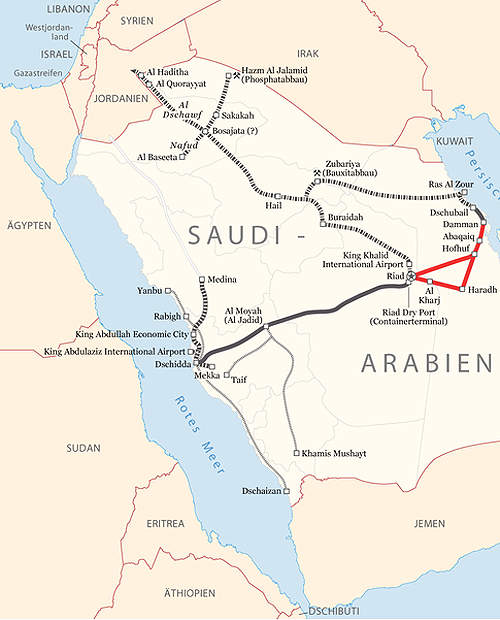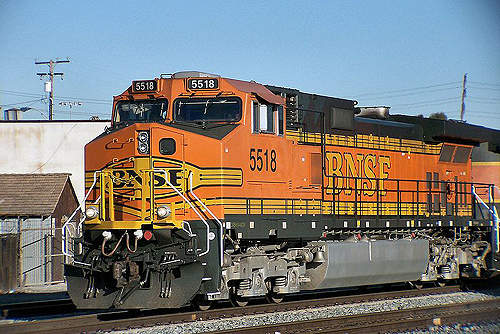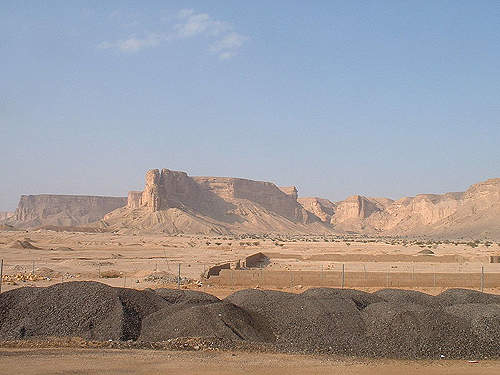The North-South Railway (NSR) project in Saudi Arabia is the world’s largest railway construction and the longest route to adopt the European train control system (ETCS) to date. It is a 2,400km passenger and freight rail line originating in the capital city Riyadh, in the northwest of the country, to Al Haditha, near the border with Jordan.
The industrial line is a 1,486km rail line from Al Jalamid (phosphate belt) in the north to Al Azbirah (bauxite belt) in the centre of the country and will run eastwards to the processing and export facilities at Raz Az Zwar. The 1,418km passenger line runs from Riyadh and passes through industrial stations in Sudair, Al Quassim, Hail, Al-Jawf and Al -Basyata to Al Haditha.
The North-South Railway line is being built as a part of 3,900km rail expansion plans. The other two projects include a 1,100km landbridge project connecting the eastern and western parts of Saudi Arabia and a 450km high-speed rail link from Haramin to Jeddah, connecting Makkah and Madinah.
Due to its strategic importance in contributing to the national economy, the North-South Railway has been given priority over the other projects. It is an integral part of the planned phosphate and bauxite mining projects in the northern region of the country, which are available in commercial quantities and can be exported from the processing facilities at Raz Az Zwar on the Gulf coast. This will make Saudi Arabia the second largest exporter of minerals in the world.
The project is expected to transport four million tons of commodities and two million passengers every year.
North-South Railway project
The project involves construction of a single 2,400km track, sidings, yards, depots, stations and administrative facilities.
Total cost of the project is estimated to be $3.5bn, and will be financed by the Public Investment Fund (PIF) managed by the Ministry of Finance. The project commenced in 2005 and is expected to be completed by 2011-12. Freight operations are scheduled to begin by the end of 2010 while the passenger operations are likely to begin in 2011-12.
A consortium of Louis Verger, Systra, Canarail and Saudi Consolidated Engineering was appointed as the project implementation and supervision consultancy on a 75-month contract in 2004. The consultancy completed the detailed engineering designs of the project in 2005.
On 3 April 2007, three civil and track works contracts were signed with a consortium of international and local companies. The first contract valued SAR2.3bn was signed with the construction company Saudi Binladin Group and Mohammed Al-Swailem Co. in partnership with a German firm for a 576km stretch from Al Zubirah to Ras Az Zwar. The second contract was awarded to the AlSuwaikat group of companies for a 440km stretch from Al Zubirah to the middle of the desert in Al Nafude for SAR1.9bn.
The third contract worth SAR2.8bn was awarded to Barclay Mowlem of Australia, Mitsui of Japan and Al-Rashed of Saudi for laying a 750km railroad from the middle of Al Nafude to Al Haditha, Al Jalamid and Al Basyata.
A commercial corporation, Saudi Railway Company (SAR), was created to maintain and operate the North-South Railway line through a contract based operator. On 9 April 2009, SAR signed three new contracts to continue work on the railway. A contract to build European style signalling, ticketing, communications and security systems was awarded to a French group, Thales, and to Saudi Binladin group for $453m. The second contract for design and manufacture of 4300HP locomotives was awarded to the US firm, ElectroMotive Diesel Inc., for $90m and the third contract worth $91.3m was awarded to China’s CSR group who will design and manufacture the proposed 668 wagons.
In March 2010, SAR signed a three year contract worth $74.1m with Rites Ltd. to operate the rail line that will transport minerals. Rites Ltd. is a state owned logistics and infrastructure subsidiary of Indian Railways.
North-South Railway infrastructure
The North-South Railway will have 107 bridges and 2,679 culverts along the 2,400km freight and passenger line. This stretch involves construction of a 280km rail line in the Al Nafude desert between Hail and Al Jawf.
The bridges will be assembled with pre-stressed concrete spans of 20m in length. A standard Continuous Welded Rail (CWR) track-form will be used throughout the line for easy maintenance. RCC culverts will be cast using in-situ bored piles.
The North-South Railway line will accommodate axle loads up to 32.4t with 1,800 concrete sleepers laid every kilometre. Each concrete sleeper weighs 60kg / m.
As of April 2010, 800km of the 1,486km industrial line had already been laid. This line is intended to transport 16,000t of minerals in a single journey.
Signalling and communications
The entire 2,400km rail route will be equipped with a centralised traffic control (CTC) signalling system. In addition, the industrial rail line will be equipped with a computer-assisted manual block system.
Rolling stock
The passenger route from Riyadh to Al Haditha will accommodate trains travelling at 250km/h but this will be limited to 160km/h. The freight trains will be running at a speed of 80km/h when loaded and 100km/h when empty.
The North-South Railway line will deploy 25 diesel locomotives with 4,300hp engines. Each locomotive will be 3km long, with 160 wagons and each wagon will carry 100t of minerals. Of the 668 wagons, 524 will be used to transport phosphate.
North-South Railway future
Tenders have been invited to begin work on the passenger line for the construction of six rail stations and mosques at Al-Haditha, Al-Jawf, Hail, Al-Qassim, Al-Majma’h and Al-Riyadh, as well as SAR’s headquarters in Al-Riyadh. The pre-qualification of tenders will begin from 30 June 2010.




